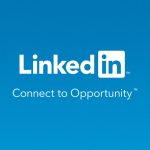Communities that form online are communities of interest. It doesn’t matter where you are from or who your parents are or whether you were born into wealth. If you share an interest with others, you are likely to meet them on the Internet. This great capacity of information networks has already been harnessed to produce websites for job seekers (CareerBuilder.com, MediaBistro.com etc.), but also to create space for individuals to connect as professionals.
 LinkedIn is probably the most popular of these websites, although there are others. LinkedIn may be the most successful because it allows all participants to spell out their areas of expertise and to create connections to those they know in “real life.” But what it also does, is to allow subscribers to see the further connections of their ‘real’ or existing connections, and see potential leads for jobs among the contacts of their contacts. One can also get ‘endorsements’ for one’s work from co-workers or others familiar with their professional abilities.
LinkedIn is probably the most popular of these websites, although there are others. LinkedIn may be the most successful because it allows all participants to spell out their areas of expertise and to create connections to those they know in “real life.” But what it also does, is to allow subscribers to see the further connections of their ‘real’ or existing connections, and see potential leads for jobs among the contacts of their contacts. One can also get ‘endorsements’ for one’s work from co-workers or others familiar with their professional abilities.
 Facebook is not a professional networking website on the surface, but precisely because personal connections translate into professional ones, what you do on Facebook gives you a public face and lets people know what your interests are and how you relate to your work. If you have a Facebook account, you can expect that prospective employers may want to look at your profile and assess whether you would be the sort of person they would want to represent their organization. If you are concerned about the content of your Facebook feed, and especially about the images of you accessible to the public, you may want to think about altering or suspending your activities there temporarily.
Facebook is not a professional networking website on the surface, but precisely because personal connections translate into professional ones, what you do on Facebook gives you a public face and lets people know what your interests are and how you relate to your work. If you have a Facebook account, you can expect that prospective employers may want to look at your profile and assess whether you would be the sort of person they would want to represent their organization. If you are concerned about the content of your Facebook feed, and especially about the images of you accessible to the public, you may want to think about altering or suspending your activities there temporarily.
Our alumna Jayelle tells us about her own preferred ways of networking:
When looking for new opportunities or even freelance work the sites I use the most
Jayelle Dorsainville, Social Media Marketing
are: LinkedIn, MediaBistro.com, JournalismJobs.com, and CareerBuilder.com. LinkedIn has grown into a fully functional social networking site that employers can use as a tool to look for a job candidate. There is also always the option of visiting the career site for the company you hope to work for. Experience is so important to building your resume. During college I interned non-stop because I knew that once I graduated employers would not be solely impressed with my degree. Even if you apply to five internships and hear back from one, that is an opportunity. It is never too early to start building your professional network and experience.



